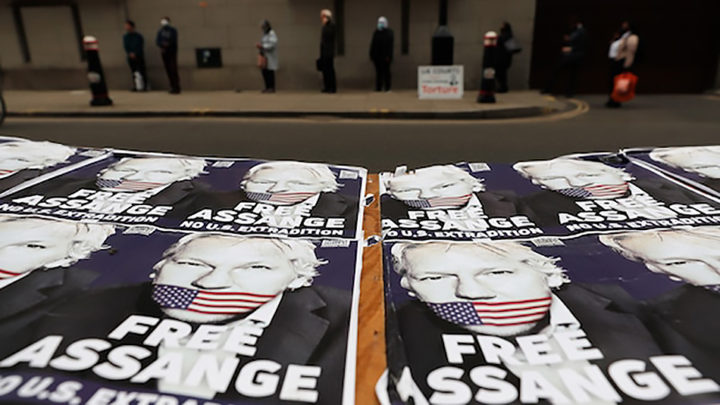By Jhon Sánchez
A London judge denied Assange extradition based solely on his mental and physical health. The Magistrate Judge Baraitser writes, “I find that the mental condition of Mr. Assange is such that it would be oppressive to extradite him to the United States of America.”
Julian Assange has been facing extradition charges since 2000: First against Sweden for sexual assault allegations and later against the United States under the Espionage Act. Even though the Obama administration didn’t charge Assange, Trump decided to indict him for 18 counts denying his profession as a journalist and criminalizing the publication of classified material. At least 1695 journalists from 99 countries have condemned the charges as persecution of the legitimate exercise of journalism.
The judge’s decision denied the defense’s arguments under human rights law. The ruling stated that the extradition would assure a fair trial in the United States, for valid charges and with no violation of the press freedom.
Julian Assange himself explained why he couldn’t face a fair trial in the United States.
It’s not possible to have a fair trial because all the trials are held in Alexandria, Virginia, where the jury pool is compromised of the highest density of military and government employees in all of the United States. It’s not possible to have a fair trial, because the U.S. government has a precedent of applying state secret privilege to prevent the defense from using material that is classified in their favor. It’s not possible to have a fair trial, because as a defendant in a national security case, you are held under special administrative measures, which makes it very hard to look at any of the material in your case, to meet with your lawyers, to speak to people, etc. So, this is — it’s just simply not a fair system.
According to human rights law, in order for a charge to be valid, it cannot be vague and overbroad. This means that the accused needs to know that his behavior could cause damage. A person knows that killing is wrong because he/she can foresee the damage caused by killing. The judge decided that the Espionage Act wasn’t vague because it’s limited by the language of damage against national security. But what the U.S. government called damage to national security is no more than the government’s intent to hide from public scrutiny its corruption and human rights violations. Thanks to Assange, for example, today, we could prosecute the perpetrators of the killing of unarmed Iraqi civilians and two Reuters employees in the video called “Collateral Murder.” The government tries to scare journalists from fulfilling their obligations of denouncing, investigating, and reporting. Besides, Daniel Ellsberg, the famous whistleblower of the Pentagon Papers, declared under oath that there was ‘zero’ evidence that Assange’s publication would cause any damage. And he also added, “The American public needed urgently to know what was being done routinely in their name, and there was no other way for them to learn it than by unauthorized disclosure.”
Regarding press freedom and allegations that Assange prosecution is persecution of journalism, the Magistrate Judge Vanessa Baraitser writes,
Secondly, in relation to the defence submission that Mr. Assange’s conduct was lawful, I have already determined not only that Mr. Assange’s conduct would be capable of constituting criminal offences in England and Wales but also that his prosecution in this jurisdiction would not be prevented by the operation of Article 10.
What the judge is saying here is that she would authorize the prosecution of any British journalist who denounces human right abuses in British soil, that she would endorse the British government in the pursuit of extraditing any foreign journalist, and that she would extradite any journalist to any part of the world if there are allegations of compromising national security.
She forgot the implications of the Pentagon Papers case where the U.S. Supreme Court prevented the Nixon administration’s attempt to restrain the New York Times from publishing the information provided by Daniel Ellsberg in 1971.
After Baraitser’s ruling, journalists of the world are on the brink of facing criminal charges, and could be extradited to any part of the world for doing their job: reporting. But under United States law, extradition is not even necessary: kidnapping would suffice. In United States v. Alvarez-Machain, 504 U.S. 655 (1992), the Supreme court declared ‘legal’ that a mere civilian could travel to a foreign country, abduct a foreign national, and forcefully brought him to face charges to the United States.
The only solution now is that the upcoming Biden administration would drop the charges. We hope that Biden would align with Obama in the matter. However, ten years ago, Biden had implied that Assange had committed a crime, saying, “If he conspired to get these classified documents with a member of the U.S. military that is fundamentally different than if someone drops on your lap … you are a press person, here is classified material.”
Your honor, Magistrate Judge Vanessa Baraitser. Your decision is a disgrace for press freedom. This is Jhon Sánchez from New York, reporting.










